イベント&アクティビティ
Nora Kottmann presents COVID survey findings at JSAA conference
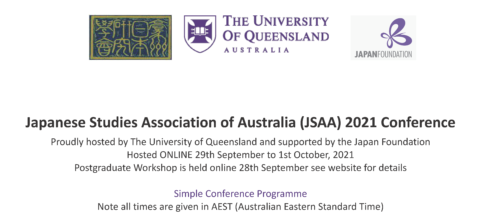
DIJ researcher Nora Kottmann will present her paper “Space, place and the pandemic: First insights into changing spatial configurations of singles’ intimate practices” at this week’s Japanese Studies Association of Australia (JSAA) 2021 Conference. It is part of the panel “Singles and Intimate Practices in COVID times: Perspectives from an Original Survey” which also includes presentations by her cooperation partners Laura Dales and Akiko Yoshida. The panel presents findings from the analyses of the survey data, with an aim to better understand the lives and non-familial relationship worlds of unmarried adults, and the experiences and practices from COVID-19 related changes to lifestyle and social practices. This research is part of Nora’s project COVID-19 and its effects on singles in Japan: Personal relationships and practices of intimacy in the time of ‘social distancing’ and ‘self-discipline’. The panel session takes place on Thursday, September 30th, from 11.30 am JST. Conference programme here
Journal article reviews studies on new venture entrepreneurship
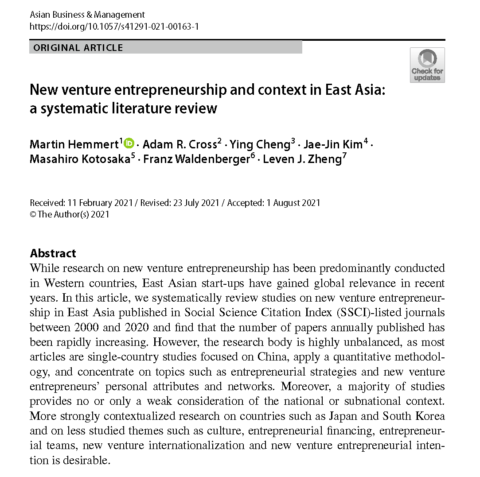
DIJ director Franz Waldenberger and DIJ alumnus Martin Hemmert (Korea University) are authors of a new open access article that systemically reviews studies on new venture entrepreneurship in East Asia. “New venture entrepreneurship and context in East Asia: a systematic literature review” (Asian Business & Management, online first), jointly researched and written with Adam R. Cross, Ying Cheng, Jae‑Jin Kim, Masahiro Kotosaka, and Leven J. Zheng, examines articles published in Social Science Citation Index (SSCI)-listed journals between 2000 and 2020. It finds that the research body is highly unbalanced: most articles are single-country studies focused on China, apply a quantitative methodology, and concentrate on topics such as entrepreneurial strategies and new venture entrepreneurs’ personal attributes and networks. More contextualized research on countries such as Japan and South Korea and on less studied themes such as culture, entrepreneurial financing and teams, new venture internationalization and entrepreneurial intention is desirable. The article is an outcome of the DIJ research project Start-ups in Asia – the role of agglomerations and international linkages.
DIJ researchers at EAJS, EACS, and ICAS virtual conferences

Every three years, Japanese Studies experts from all over the world present their latest research at the European Association for Japanese Studies (EAJS) conference. From 24-28 August, Franz Waldenberger, Susanne Brucksch, Isaac Gagné, Sonja Ganseforth, Barbara Geilhorn, Markus Heckel, Nora Kottmann, Harald Kümmerle, Torsten Weber, and Yufei Zhou will participate in this year’s virtual EAJS conference as presenters, discussants, or chairs in the sections ‘Anthropology and Sociology’, ‘Economy, Business and Political Economy’, ‘Language and Linguistics’, ‘Intellectual History and Philosophy’, ‘Urban, Regional and Environmental Studies’, and ‘Performing Arts’. Programme and details here. In addition, Yufei Zhou will give a presentation on “Transoceanic Contacts in the Making of Sinological Knowledge” at the European Association for Chinese Studies (EACS) conference on August 27 and Sonja Ganseforth will present her book publication Rethinking Locality in Japan (Routledge 2021), co-edited with DIJ alumnus Hanno Jentzsch, at the International Convention of Asia Scholars (ICAS) on August 28.
New edited volume on Locality in Japan
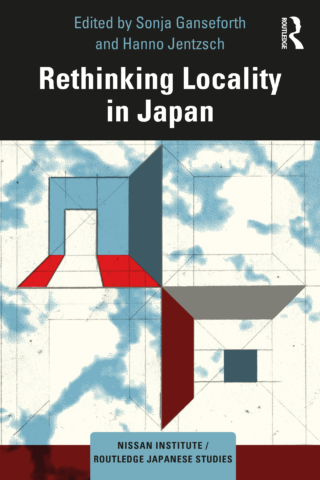
What does it mean when we say “local” and what does “local” mean in the Japanese context? Rethinking Locality in Japan, edited by DIJ researcher Sonja Ganseforth and DIJ alumnus Hanno Jentzsch (Vienna), examines broader political and socio-economic shifts in Japan through the window of locality. It covers demographic change, electoral and administrative reform, rural decline and revitalization, welfare reform, and the growing rift in energy and food production. Chapters discuss the different ways in which locality in Japan has been reconstituted, from historical and contemporary instances of administrative restructuring to more subtle social processes of making and unmaking local places. Contributors include the co-editors Sonja Ganseforth (“Territorialized yet Fluid Locality: Reform, Consolidation, and the More-than-Human in Japanese Fishery Cooperatives”) and Hanno Jentzsch (“San’ya – The Making and Unmaking of a Welfare Quarter”) as well as DIJ researchers Barbara Holthus (“The Meaning of Place for Selfhood and Well-being in Rural Japan”, with Wolfram Manzenreiter) and Isaac Gagné (“Mapping the Local Economy of Care: Social Welfare and Volunteerism in Local Communities”). The volume is an outcome of the DIJ’s research focus The Future of Local Communities in Japan.
New ‘Citizen Science in the Digital Age’ Opinion Paper
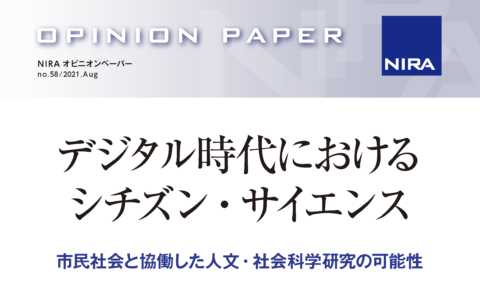
Citizen science, in which citizens and scientists collaborate to generate and utilize data and knowledge, is an important approach to co-creating society. While citizen science in the natural sciences is well established, it is still in its infancy in the humanities and social sciences. To use the citizens’ knowledge to solve social problems it is necessary to design protocols for citizen participation, to involve universities in supporting citizen science, and to build data provision and management systems that take into account data ownership and privacy protection. At a conference co-organized by the NIRA Research Institute, the DWIH Tokyo, and the DIJ, researchers from Japan and abroad discussed the possibilities of citizen science to contribute to the development of research in the humanities and social sciences. DIJ director Franz Waldenberger contributed the closing comments. The opinion paper ‘Citizen Science in the Digital Age’ based on this conference has now been published (in Japanese). A PDF version is available for download here
New journal article examines post-3.11 plays and cultural trauma
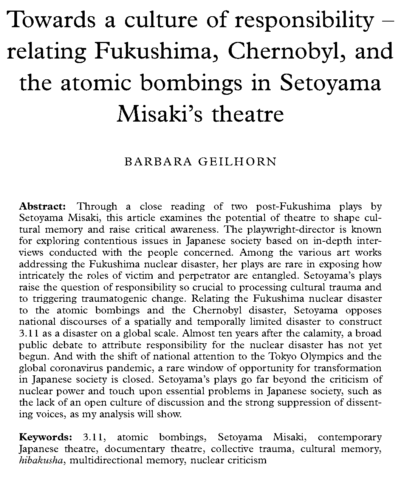 A new journal article by DIJ researcher Barbara Geilhorn studies two post-Fukushima plays by Setoyama Misaki to examine the potential of theatre to shape cultural memory and raise critical awareness. Among the various art works addressing the Fukushima nuclear disaster, Setoyama’s plays are rare in exposing how intricately the roles of victim and perpetrator are entangled. Relating Fukushima to the atomic bombings and the Chernobyl disaster, Setoyama opposes national discourses of a spatially and temporally limited disaster to construct 3.11 as a disaster on a global scale. Setoyama’s plays go far beyond the criticism of nuclear power and touch upon essential problems in Japanese society, such as the lack of an open culture of discussion and the strong suppression of dissenting voices, as the analysis shows. The article is an outcome of Barbara’s research project Local Issues Take Stage – Culture and Community Revitalization. It was published in Japan Forum, online first, and can be accessed here.
A new journal article by DIJ researcher Barbara Geilhorn studies two post-Fukushima plays by Setoyama Misaki to examine the potential of theatre to shape cultural memory and raise critical awareness. Among the various art works addressing the Fukushima nuclear disaster, Setoyama’s plays are rare in exposing how intricately the roles of victim and perpetrator are entangled. Relating Fukushima to the atomic bombings and the Chernobyl disaster, Setoyama opposes national discourses of a spatially and temporally limited disaster to construct 3.11 as a disaster on a global scale. Setoyama’s plays go far beyond the criticism of nuclear power and touch upon essential problems in Japanese society, such as the lack of an open culture of discussion and the strong suppression of dissenting voices, as the analysis shows. The article is an outcome of Barbara’s research project Local Issues Take Stage – Culture and Community Revitalization. It was published in Japan Forum, online first, and can be accessed here.
DIJ expertise on Tokyo Olympics in international media

The Tokyo Olympics are now history — but what remains as their legacy? During the past few weeks several international media have interviewed DIJ director Franz Waldenberger and deputy director Barbara Holthus as well as principal researchers Sonja Ganseforth and Torsten Weber on different aspects of the Games. Franz Waldenberger commented on the exploding costs of Tokyo 2020 for Tagesschau online and the DLF Players podcast. Barbara Holthus appeared in live TV interviews on Al Jazeera, the BBC and was quoted in AP News, DLF radio, HR radio, Welt, and several other German and international media. An interview with Sonja Ganseforth on the anti-Olympic protests appeared in Japanese in the Mainichi daily newspaper. Comments by Torsten Weber on Tokyo’s Olympic past appeared in the Neue Zürcher Zeitung, Frankfurter Rundschau, Münchner Merkur, and Weekendavisen. For more information on research related to the Olympics, see the DIJ’s special project on the Tokyo Olympics and the open access book publication Japan Through the Lens of the Tokyo Olympics.
Summer issue of DIJ Newsletter published
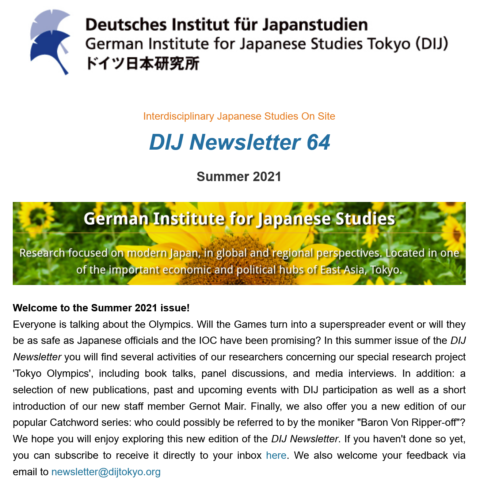
We have just published the summer issue of our DIJ Newsletter featuring updates on our research, publications, and outreach activities. In this issue you will find a selection of our recent and forthcoming activities, including a panel discussion on the Tokyo Olympics in cooperation with the Japanese-German Center Berlin (JDZB); a Web-Forum series on Digital Transformation; new book publications by Susanne Brucksch, Barbara Geilhorn, Sonja Ganseforth, and our alumnus Hanno Jentzsch; a profile of our new staff member Gernot Mair; a new edition of our Catchword series; and much more. We hope you will enjoy exploring this new edition of the DIJ Newsletter. If you haven’t done so yet, you can subscribe to receive it directly to your inbox. The full issue and subscription form are available here.








 Open Access
Open Access
